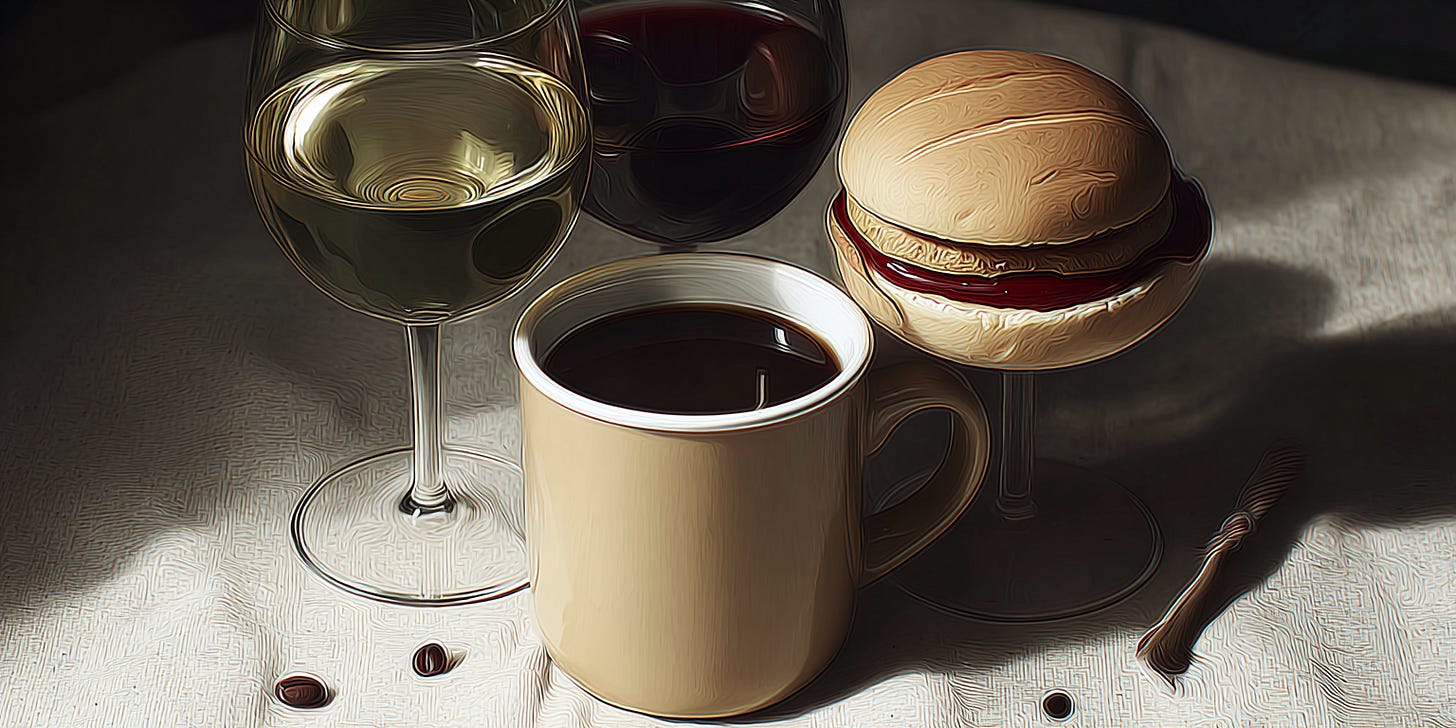Some People are Calling for Wine Drinking to be More Mindful. Not me.
Can you describe how this Pinot Grigio makes you feel? No, it's just an affordable glass of white wine that, right now, I'd prefer to a beer or a cocktail
In 2004, beef consumption in the UK was 2% lower than the previous year. It is estimated that beef production this year will fall by a further 4%.
Across the Atlantic, the United States Department of Agriculture (USDA), projects a 4.8% drop in beef production next year, with a 4.6% drop in per capita consumption and a 1.9% decline in imports.
However, McDonald’s global sales for the second quarter of 2025 are up by 6%.
Okay, so the hamburger giant’s sales figures reflect its business across the world, and it now offers salads and chicken and plant-based options, but it is still very much in the business of selling beef, and it seems to be bucking the trend.
McDonald’s (and Burger King’s and Wendy’s) relationship to cows is, for most wine people, similar to the one between Barefoot, 19 Crimes and supermarket own-brand Pinot Grigio to thousands of hectares of soon-to-be harvested grapes: crucial but, for many, best left undiscussed.
Most wine professionals and enthusiasts have probably rarely, if ever, tasted any of these wines, and, unless forced to do so by their children, more than likely rarely eat at McDonald’s.
Unlike 87% of the US population.
The pattern is similar if we look at coffee. I’m guessing that most of those same wine fans and pros have some form of device in their homes that involves ground coffee; they may well fall into the 70% of UK households with more or less sophisticated machines with which to make their morning cup. But, when it comes to buying coffee to drink at home, most Britons resort to instant. According to the latest World Coffee Portal, the figure is a possibly surprising 64%, compared to 48% for ground and 47% for pods.
Eagle-eyed readers will have noticed that these figures add up to more than 100%. This is because it is apparently common for people, even the owners of those snazzy devices, to drink both instant and beans. Indeed, according to Statista, no fewer than 73% of Britons drink instant coffee. So, while interest in speciality and single-region coffee is growing, so is demand for the convenience of the powder or granules.
As the Times reported in January, in Waitrose, one of the UK’s biggest and most premium grocery chains, website searches for instant coffee are up 45 per cent, year on year.
So, let’s get back to wine - which is probably why you’re here.
There is increasing online chatter about the need to move away from discussions of aroma and flavour and to talk more about emotions: how does any particular make you feel? Wine drinking, it is proposed, should be more ‘mindful’.
Naturally, as someone who ‘gets’ it, I know all too well the effect really fine wine can have, on some people, some of the time, but I’ve seen enough of it being quaffed unthinkingly to know that this impact is far from universal.
But, let’s get serious here. Does anyone seriously imagine that most basic Pinot Grigio, Merlot, Moscat, rosé and red blends are going to be consumed with any more attention - emotional or otherwise - than a burger or a cup of instant? That’s not how I drink perfectly enjoyable, unambitious wine.
Just as importantly, as an industry, do we really want everyone who’s chomping on their Big Macs or drinking their basic coffee or wine to be pausing to think about it? Wouldn’t that inevitably reduce their consumption?
Of course, there are those aesthetes and vegetarians who’d be delighted to see a complete halt to Barefoot, Nescafe and burger consumption, but even they would concede that this wouldn’t lead to a universal switch to the ‘real’ stuff. In the case of wine, it would inevitably mean an acceleration in the already-growing process of vineyard uprooting and wine business redundancies.
And I, for one, am quite mindful of that.
Don’t get me wrong. Of course, I’d prefer the serious stuff to get more attention, but let’s be honest: how large a proportion of every year’s annual global production does it really represent?
Apart from writing these posts and working on le Grand Noir and K’AVSHIRI, the two wine brands I helped conceive and co-own, I also offer strategy and marketing consultancy and a range of public speaking.
If you think I can be of help to your business, or would just like to get in touch, please contact me at robertjoseph@winethinker.com






Why is wine always treated differently than a can of beer? Sometimes I just want a glass of cold white, the colder the better. If it's screw-cap, it's one less thing that can go wrong.
I'm guilty of advising my students to be more mindful when tasting wine, in the context of wine assessment. When people struggle to describe wine aromas, shutting down external distractions helps them focus and sense. It also helps in smell training to enhance their sensory skills.
Of course, I realize it's different from the consumption context you share here; I just want to hold a space for mindful smelling/tasting when it matters.
Thanks!